-
 Bitcoin
Bitcoin $99,468.4344
2.10% -
 Ethereum
Ethereum $2,838.8981
3.47% -
 XRP
XRP $2.7089
0.42% -
 Tether USDt
Tether USDt $1.0004
0.01% -
 BNB
BNB $666.9747
2.65% -
 Solana
Solana $180.2041
3.94% -
 USDC
USDC $1.0000
0.00% -
 Dogecoin
Dogecoin $0.2608
2.70% -
 Cardano
Cardano $0.8149
3.45% -
 TRON
TRON $0.2476
2.87% -
 Chainlink
Chainlink $19.0162
5.01% -
 Sui
Sui $3.5596
8.38% -
 Avalanche
Avalanche $26.4313
7.52% -
 Stellar
Stellar $0.3462
1.10% -
 Litecoin
Litecoin $138.8683
8.27% -
 Hedera
Hedera $0.2296
4.92% -
 Shiba Inu
Shiba Inu $0.0...01595
3.58% -
 Toncoin
Toncoin $3.6907
3.03% -
 UNUS SED LEO
UNUS SED LEO $9.7498
0.37% -
 Hyperliquid
Hyperliquid $25.4285
3.36% -
 Polkadot
Polkadot $5.3046
6.86% -
 MANTRA
MANTRA $7.5663
1.81% -
 Bitcoin Cash
Bitcoin Cash $332.9317
3.34% -
 Ethena USDe
Ethena USDe $1.0000
0.06% -
 Bitget Token
Bitget Token $4.8667
11.49% -
 Uniswap
Uniswap $9.6079
4.45% -
 Dai
Dai $1.0001
-0.02% -
 Monero
Monero $236.4426
2.66% -
 NEAR Protocol
NEAR Protocol $3.6058
9.66% -
 Pepe
Pepe $0.0...01011
7.06%
What are DeFi's regulatory agencies?
Decentralized finance (DeFi) presents unique regulatory challenges due to its decentralized architecture and the jurisdictional complexities it poses, as DeFi protocols often operate across multiple jurisdictions, making it difficult to determine which laws and regulations apply and which regulatory bodies have jurisdiction.
Feb 16, 2025 at 05:18 am
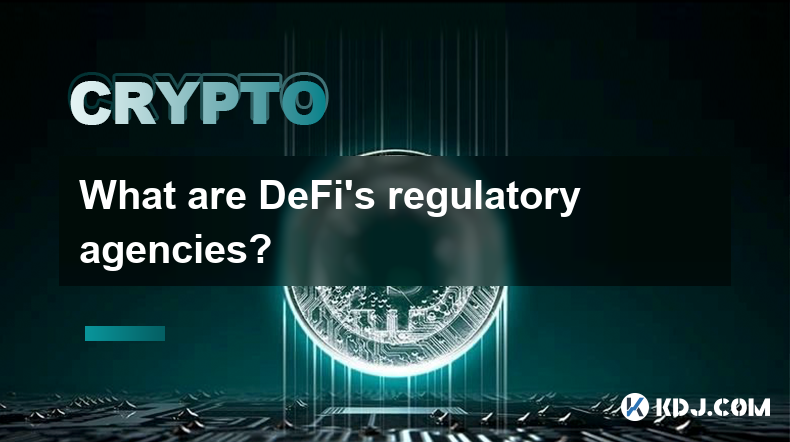
Key Points:
- DeFi: Definition, Architecture, and Regulatory Challenges
- Role of Decentralized Autonomous Organizations (DAOs) in Self-Regulation
- Legal Frameworks for DeFi in the United States and European Union
- International Cooperation and the Global DeFi Regulatory Landscape
- Jurisdictional Issues and Considerations for DeFi Entities
- Enforcement Actions and Litigation Related to DeFi
- Compliance Requirements for DeFi Exchanges and Custody Services
What is DeFi?
Decentralized finance (DeFi) refers to the emerging ecosystem of blockchain-based financial applications and services that operate autonomously without the need for intermediaries such as banks or other centralized authorities. DeFi protocols enable users to borrow, lend, trade, hedge, and insure, among other financial functions. They leverage distributed ledger technology and smart contracts to facilitate transactions and automate operations.
DeFi Architecture and Regulatory Challenges
Unlike traditional finance, DeFi protocols are decentralized in nature, meaning they are not controlled by a single entity. This distributed architecture presents unique regulatory challenges. First, it raises the question of who or what entity should be held accountable for potential misconduct or compliance violations. Traditional regulatory frameworks often rely on identifying specific individuals or organizations responsible for enforcing laws. However, in the decentralized DeFi landscape, such identification can be difficult.
Secondly, the global nature of DeFi poses jurisdictional challenges. DeFi protocols often operate across multiple jurisdictions, making it challenging to determine which laws and regulations apply and which regulatory bodies have jurisdiction. Moreover, different jurisdictions may have varying approaches to regulating DeFi, leading to regulatory fragmentation and uncertainty for industry participants.
Decentralized Autonomous Organizations (DAOs) in Self-Regulation
One potential mechanism for self-regulation in DeFi is the emergence of decentralized autonomous organizations (DAOs). DAOs are community-led organizations that operate through smart contracts and rely on collective decision-making by their members. DAOs can play a role in establishing and enforcing standards of conduct, initiating community-led investigations, and implementing disciplinary measures for protocol breaches. However, it is important to note that DAOs themselves pose unique regulatory challenges, as their decision-making processes and accountability mechanisms may not align with existing legal frameworks.
Legal Frameworks for DeFi in the US and EU
In the United States, DeFi has largely been treated as an unregulated sector, although various government agencies, including the Securities and Exchange Commission (SEC) and Commodity Futures Trading Commission (CFTC), have issued guidance and taken enforcement actions against certain DeFi activities, particularly those involving unregistered securities offerings and manipulative trading practices.
In the European Union, the Markets in Crypto Assets (MiCA) regulation is expected to establish a comprehensive framework for regulating DeFi and other cryptocurrency-related activities. MiCA aims to bring clarity and harmonization to the DeFi space within the EU, ensuring consumer protection and financial stability while fostering innovation.
International Cooperation and Global DeFi Regulatory Landscape
The global DeFi regulatory landscape is still evolving, with varying approaches and levels of regulation across different jurisdictions. International cooperation is crucial to ensure a consistent and coordinated regulatory approach to address cross-border DeFi activities and prevent regulatory arbitrage. Organizations such as the Financial Stability Board (FSB) and the International Monetary Fund (IMF) have been actively engaged in monitoring and providing guidance on DeFi regulatory developments globally.
Jurisdictional Issues and Considerations for DeFi Entities
DeFi entities operating across multiple jurisdictions need to carefully consider the applicable laws and regulations in each jurisdiction where they operate. Failure to comply with local regulations can expose these entities to legal and financial risks, including regulatory fines, sanctions, and civil liabilities. Engaging with local legal counsel and industry experts can help DeFi entities navigate the complex and fragmented regulatory landscape and ensure compliance with applicable laws.
Enforcement Actions and Litigation Related to DeFi
Regulatory authorities have initiated numerous enforcement actions and litigation against DeFi entities, particularly in cases of suspected fraud, manipulation, and unregistered securities offerings. In the United States, the SEC has brought several enforcement actions against DeFi projects and individuals for violating securities laws. Similarly, the CFTC has taken enforcement actions against DeFi platforms and entities for offering illegal derivatives and engaging in deceptive practices.
Compliance Requirements for DeFi Exchanges and Custody Services
DeFi exchanges and custody services face compliance obligations similar to traditional financial institutions. These obligations include, but are not limited to, Know Your Customer (KYC) and Anti-Money Laundering (AML) requirements, reporting suspicious activity, and maintaining adequate capital and liquidity. By adhering to industry best practices and regulatory requirements, DeFi exchanges and custody services can enhance their credibility and reputation while ensuring the safety and protection of customer assets.
FAQs
What are the key challenges in regulating DeFi?
Regulating DeFi presents several challenges due to its decentralized nature, jurisdictional complexities, and the potential for financial stability risks. Balancing innovation and protecting consumers and investors remains the primary focus of regulatory efforts.
How can DAOs contribute to self-regulation in DeFi?
DAOs, as decentralized organizations, can potentially play a role in establishing industry standards, enforcing community rules, and initiating disciplinary measures. However, they need to ensure accountability and transparency in their decision-making processes and align with applicable legal frameworks.
What is the current regulatory landscape for DeFi in the US and EU?
In the US, DeFi is largely unregulated, with regulatory guidance primarily focusing on specific activities such as securities offerings and market manipulation. In the EU, the MiCA regulation aims to provide a harmonized framework for regulating DeFi and other crypto assets.
How do jurisdictional issues impact DeFi entities?
DeFi entities operating across multiple jurisdictions need to comply with applicable laws and regulations in each jurisdiction. Failure to do so exposes these entities to legal and financial risks. Engaging with local experts is crucial for navigation and compliance.
What are the common enforcement actions related to DeFi?
Regulatory authorities have taken enforcement actions against DeFi entities for alleged fraud, manipulation, unregistered securities offerings, and deceptive practices. Ongoing litigation involves civil and criminal charges related to these activities.
What compliance requirements apply to DeFi exchanges and custody services?
DeFi exchanges and custody services face similar compliance requirements as traditional financial institutions, including KYC and AML obligations, reporting suspicious activities, and maintaining appropriate capital and liquidity. Meeting these requirements builds trust and protects customers.
Disclaimer:info@kdj.com
The information provided is not trading advice. kdj.com does not assume any responsibility for any investments made based on the information provided in this article. Cryptocurrencies are highly volatile and it is highly recommended that you invest with caution after thorough research!
If you believe that the content used on this website infringes your copyright, please contact us immediately (info@kdj.com) and we will delete it promptly.
- Mutuum Finance (MUTM): A New Contender in the Crypto Market Priced Below $0.02 Is Rapidly Gaining Ground
- 2025-02-21 21:35:24
- Panshibi (SHIBI) gains momentum as the most anticipated meme coin for 2025
- 2025-02-21 21:35:24
- Can Ozak AI (OZ) Surpass Meme Coins Like Shiba Inu (SHIB) and Dogecoin (DOGE) in Profits by 2025?
- 2025-02-21 21:35:24
- American Citizens May Soon Receive a $5K 'DOGE Dividend' From the U.S. Government
- 2025-02-21 21:35:24
- PepeGPT ($PEPEAI) – The AI-Powered Meme Coin Primed to Explode 100x
- 2025-02-21 21:35:24
- Dogecoin News Spread a Significant Movement, Which Caused Strong Reactions Among Cryptocurrency Enthusiasts
- 2025-02-21 21:25:24
Related knowledge

What are DeFi's regulatory agencies?
Feb 16,2025 at 05:18am
Key Points:DeFi: Definition, Architecture, and Regulatory ChallengesRole of Decentralized Autonomous Organizations (DAOs) in Self-RegulationLegal Frameworks for DeFi in the United States and European UnionInternational Cooperation and the Global DeFi Regulatory LandscapeJurisdictional Issues and Considerations for DeFi EntitiesEnforcement Actions and Li...
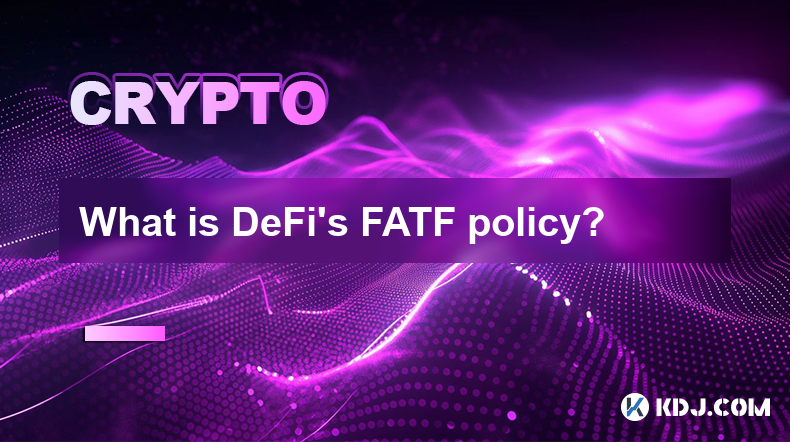
What is DeFi's FATF policy?
Feb 17,2025 at 08:06am
DeFi's FATF Policy: A Comprehensive GuideKey Points:FATF's Definition of Virtual Assets and VASPsFATF's Recommendations for DeFi PlatformsFATF's Travel Rule and its Implementation in DeFiThe Impact of FATF's Policy on DeFi AdoptionFAQs about DeFi's FATF PolicyFATF's Definition of Virtual Assets and VASPsThe Financial Action Task Force (FATF) is an inter...
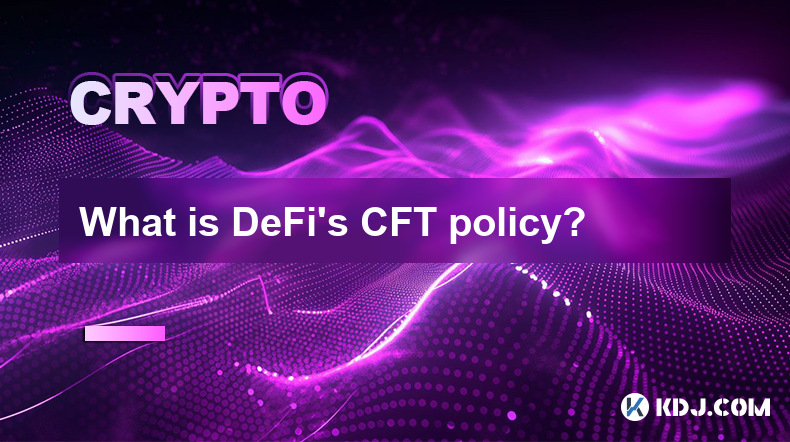
What is DeFi's CFT policy?
Feb 16,2025 at 11:54am
Key Points:Understanding CFT and its Significance in DeFiRegulatory Framework and KYC in DeFiImplementing AML/CFT Measures in DeFiProtocolsRole of Smart Contracts and Blockchain AnalysisChallenges and Future Developments in DeFi's CFT PolicyUnderstanding CFT and its Significance in DeFiCounter-Financing of Terrorism (CFT) is a crucial aspect of the cryp...
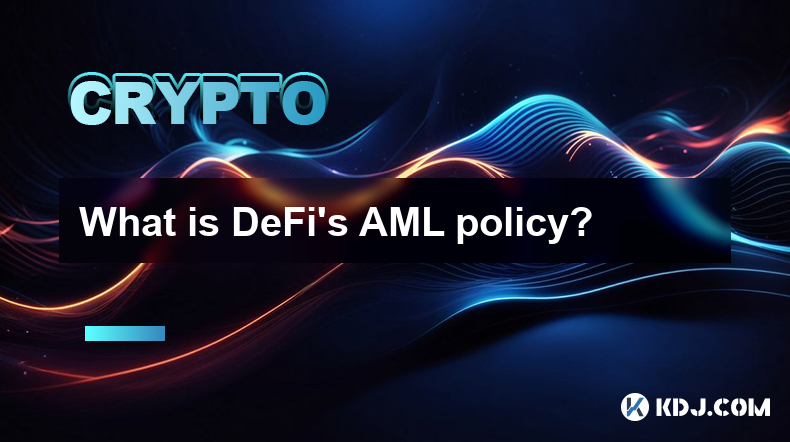
What is DeFi's AML policy?
Feb 15,2025 at 07:48pm
DeFi's AML Policy: Enhancing Compliance in the Crypto EcosystemKey Points:Understanding the Need for AML/CFT Compliance in DeFiChallenges and Limitations of DeFi AML PoliciesDecentralized Identity and Verification SolutionsSmart Contract Optimization for AML EnforcementCollaboration with Regulators and Law EnforcementUnderstanding the Need for AML/CFT C...
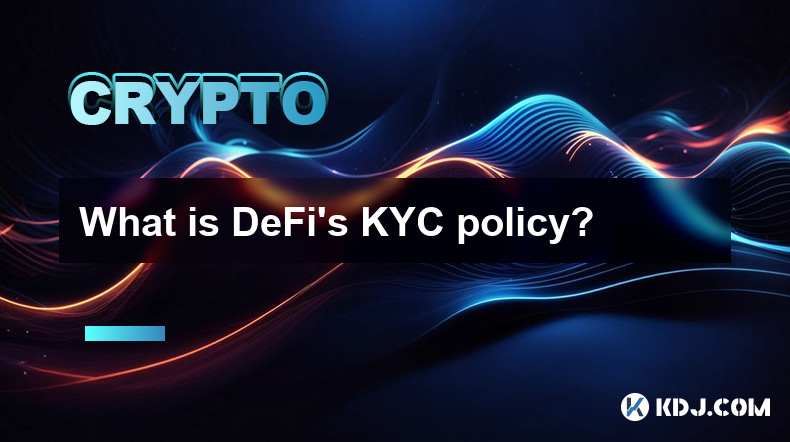
What is DeFi's KYC policy?
Feb 16,2025 at 03:51pm
Key Points:Understanding Decentralized Finance (DeFi)KYC Verification in DeFiBenefits and Drawbacks of KYC in DeFiNotable KYC-Compliant DeFi ProjectsTrends and Future of KYC in DeFiWhat is DeFi's KYC Policy?Decentralized Finance (DeFi) refers to a transformative financial ecosystem that operates on decentralized blockchain networks. Unlike traditional f...
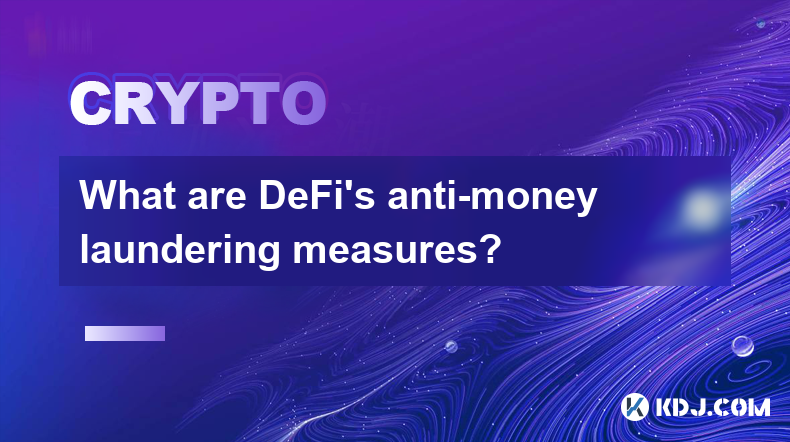
What are DeFi's anti-money laundering measures?
Feb 17,2025 at 07:19pm
Understanding DeFi's Anti-Money Laundering MeasuresKey Points:DeFi platforms utilize decentralized and pseudonymized transactions, posing unique challenges for AML compliance.Regulatory bodies are stepping up efforts to enforce AML regulations within the DeFi space.Various approaches and technologies are employed to combat money laundering in DeFi, incl...

What are DeFi's regulatory agencies?
Feb 16,2025 at 05:18am
Key Points:DeFi: Definition, Architecture, and Regulatory ChallengesRole of Decentralized Autonomous Organizations (DAOs) in Self-RegulationLegal Frameworks for DeFi in the United States and European UnionInternational Cooperation and the Global DeFi Regulatory LandscapeJurisdictional Issues and Considerations for DeFi EntitiesEnforcement Actions and Li...

What is DeFi's FATF policy?
Feb 17,2025 at 08:06am
DeFi's FATF Policy: A Comprehensive GuideKey Points:FATF's Definition of Virtual Assets and VASPsFATF's Recommendations for DeFi PlatformsFATF's Travel Rule and its Implementation in DeFiThe Impact of FATF's Policy on DeFi AdoptionFAQs about DeFi's FATF PolicyFATF's Definition of Virtual Assets and VASPsThe Financial Action Task Force (FATF) is an inter...

What is DeFi's CFT policy?
Feb 16,2025 at 11:54am
Key Points:Understanding CFT and its Significance in DeFiRegulatory Framework and KYC in DeFiImplementing AML/CFT Measures in DeFiProtocolsRole of Smart Contracts and Blockchain AnalysisChallenges and Future Developments in DeFi's CFT PolicyUnderstanding CFT and its Significance in DeFiCounter-Financing of Terrorism (CFT) is a crucial aspect of the cryp...

What is DeFi's AML policy?
Feb 15,2025 at 07:48pm
DeFi's AML Policy: Enhancing Compliance in the Crypto EcosystemKey Points:Understanding the Need for AML/CFT Compliance in DeFiChallenges and Limitations of DeFi AML PoliciesDecentralized Identity and Verification SolutionsSmart Contract Optimization for AML EnforcementCollaboration with Regulators and Law EnforcementUnderstanding the Need for AML/CFT C...

What is DeFi's KYC policy?
Feb 16,2025 at 03:51pm
Key Points:Understanding Decentralized Finance (DeFi)KYC Verification in DeFiBenefits and Drawbacks of KYC in DeFiNotable KYC-Compliant DeFi ProjectsTrends and Future of KYC in DeFiWhat is DeFi's KYC Policy?Decentralized Finance (DeFi) refers to a transformative financial ecosystem that operates on decentralized blockchain networks. Unlike traditional f...

What are DeFi's anti-money laundering measures?
Feb 17,2025 at 07:19pm
Understanding DeFi's Anti-Money Laundering MeasuresKey Points:DeFi platforms utilize decentralized and pseudonymized transactions, posing unique challenges for AML compliance.Regulatory bodies are stepping up efforts to enforce AML regulations within the DeFi space.Various approaches and technologies are employed to combat money laundering in DeFi, incl...
See all articles





















































































